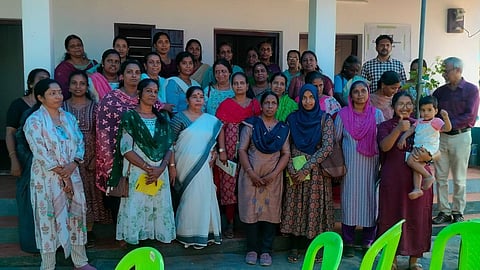

Thiruvananthapuram | Across Kerala, small businesses are taking root in the most familiar of places. In towns and villages alike, dining tables are doubling as desks and spare rooms as workspaces, as a wave of entrepreneurship reshapes the state's economy.
Kerala's Left government says over the past three and a half years, more than 350,000 new micro, small and medium enterprises have sprung up. Almost a third of them are led by women, many of whom are running their ventures from home.
With looser regulations and government-backed digital platforms, these household enterprises are beginning to redraw the economic map of the state.
At a meeting with reporters, Industries Minister P Rajeev said Kerala's industrial policy is shaped by a simple principle-- "people first, industry second." He noted that while the state continues to back traditional sectors, its priority now lies in knowledge-driven fields such as information technology and biotechnology.
For thousands of women and first-time entrepreneurs, however, the transformation is unfolding in kitchens and living rooms--ordinary spaces that have become the front lines of Kerala's new economy.
On the efforts to spur entrepreneurship, Rajeev asserted that the state government has been focusing on infrastructural development, while undertaking sweeping reforms -- from recognising internet as a basic right to allowing MSMEs to function without a license for the first three-and-a-half years.
"We have simplified all processes... licensing process, now, anybody can establish an industry in the state of Kerala without a license if it comes under the MSME category for the first three-and-a-half years," Rajeev said.
"We have two schemes -- one is Mission 1000. That is to scale up the existing industries to an average of Rs 100 crore turnover. That means 1,000 industries with Rs 1 lakh crore turnover.
"Also, we have selected around 500 MSMEs. We are giving assistance, technological backing, banking, financial assistance, working capital assistance, and marketing facilities. We have established MSME clinics in all districts," he said.
Regarding the initiative taken specifically for the women-owned MSMEs, Rajeev said the state government is offering comprehensive support.
"For local products marketing, we are establishing K-Stores, along with ration shops, and the local MSMEs can put their products there. Then we are providing K-Shoppe, which is an online marketing mechanism, e-commerce (platform)," Rajeev said.
The minister also addressed perceptions about Kerala's industrial environment.
"There's a very deep-rooted presumption that Kerala is not good for industry, but we have overcome that and now Kerala has been ranked number one in ease of doing business. Earlier, we were in 28th position," he said.
He highlighted the state's strength in "highly skilled" homemakers, saying many of them hold advanced degrees like MA, MCom, MBA, and can work from home or nearby facilities.
The government is working on upskilling them according to the requirements of the new industries, he said.
"There are MA housewives, MCom housewives, MBA housewives. They can work from home or work near home. We are providing spaces near to their houses, metro stations, we are providing workstations. And we are providing other facilities, laptops, and connectivity, to their houses," he said.
The government has created 7.5 lakh jobs through the MSME campaign during its current tenure, Rajeev claimed.
Additionally, during this year's Onam season, one lakh employment opportunities were generated by Kudumbashree -- the government's poverty eradication and women empowerment programme, the minister said.
"We are organising big job fairs and campus recruitment, and our objective is to ensure 1 lakh recruitment this academic year to address the Gen Z," he said.
Emphasising that the government is committed to addressing the aspirations of the youth and reversing the trend of brain drain, the minister said that knowledge-based industries are needed to generate employment for youngsters.
"Our people have been going out to the UK, Singapore, Malaysia, Dubai, and now Europe and the USA. But people are coming to Kerala from Bihar, UP, Rajasthan, as work is there for them, but our people have gone out for work.
"So, our objective now is to ensure employment opportunities for our own youth. That is why we are focusing on knowledge-based industries, IT-based, BT-based... these are what we are focusing on," he said.
The minister, however, highlighted that the Kerala model of development, with all its strengths, also faces some limitations.
"There is stagnation in the productive sector, agriculture, and industry. Then we are facing a second-generation problem... for example, geriatrics is not a department in health institutions, but in Kerala, it is a must because life expectancy is higher here," he said.
"We need improvement and growth in productive sectors like agriculture, industry, and infrastructure. We have recognised these challenges and are addressing them," Rajeev said.
